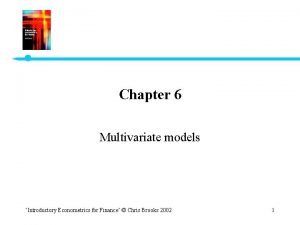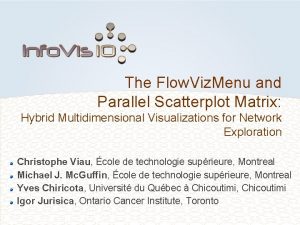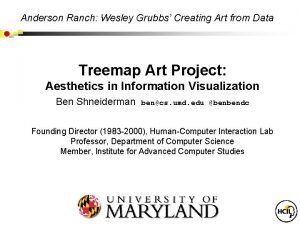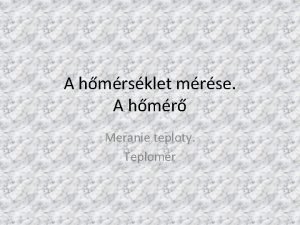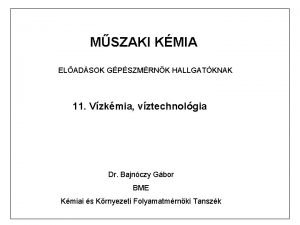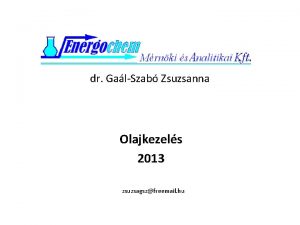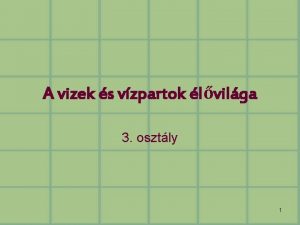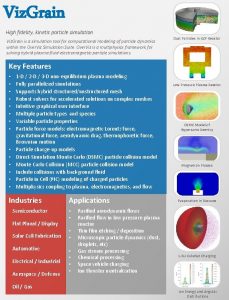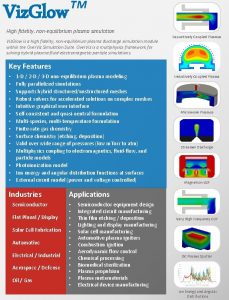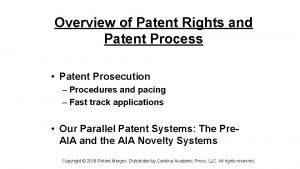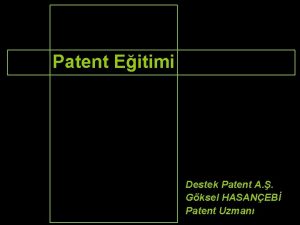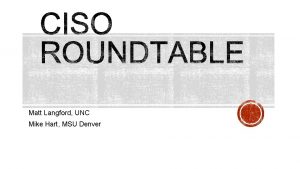Patent Viz Mike Wooldridge and Ken Langford Information


















- Slides: 18

Patent. Viz Mike Wooldridge and Ken Langford Information Visualization and Presentation Fall 2005

What is a patent? ¢ ¢ ¢ A grant of a property right by the government to an inventor. Allows the inventor to exclude others from making, using, or selling an invention. Currently in the U. S. , the term of a patent is 20 years from filing with the USPTO (utility & plant patents).

Patent Data Set More than 6 million patents have been issued by the U. S. Patent and Trademark Office. ¢ More than 150, 000 new ones are issued each year. ¢ There are more than 400 patent classes, and 120, 000 subclasses (continuously evolving). ¢

Structure of a Patent ¢ ¢ ¢ ¢ Patent Number Title Abstract Inventor Assignee Filing Date Issue Date ¢ ¢ ¢ Class Subclass Citations Claims Specifications Diagrams

Example Patent

Our visualization focuses on citations and classification ¢ Citations l Potential measure of “importance” • More citations in = greater importance l ¢ Offer an efficient way to identify relationships among patents Classification l Controlled vocabulary maintained by the USPTO

NBER Patent Database (National Bureau of Economic Research) Freely available, maintained at UC Berkeley ¢ 3 million patents from 1963 -1999 ¢ Includes 16 million citation records: ¢ Citations out l Citations in l Measures of “generality” and “originality” based on citations l

Goals of Visualization Understand patent distribution. ¢ Pinpoint potentially important patents. ¢ See if importance relates to other characteristics. ¢ Show patents are connected to one another. ¢

Related Work ¢ ¢ Commercial patent research tools. Visualization of scholarly citations.

Three Directions ¢ ¢ ¢ Tree Map Scatter Plot Graph

Tree Map Treemap 4. 1 UI: http: //www. cs. umd. edu/hcil/treemap/ ¢ 6 categories (e. g. Computers and Communications) ¢ l 36 subcategories (e. g. Computer Peripherals) • 420 classes (e. g. Incremental Printing of Symbolic Information)

Tree Map (2 -Level) Main category Class # Color = patent count

Tree Map (3 -Level)

Scatter Plot (www. patentviz. com)

Citation Graph

Future Work Test users. ¢ Manage the data. ¢ Integrate the different pieces. ¢

Comments/Suggestions?

Comments/Suggestions?
 Víz-víz hőszivattyú vízigénye
Víz-víz hőszivattyú vízigénye Ken langford
Ken langford Wooldridge econometrics slides
Wooldridge econometrics slides Econometrics
Econometrics Iwf.org.uk
Iwf.org.uk Dr peter langford
Dr peter langford Name the cell
Name the cell Susan langford
Susan langford Colin langford
Colin langford Flow viz
Flow viz Tartósítási eljárások csoportosítása
Tartósítási eljárások csoportosítása Konovalov törvény
Konovalov törvény Fin viz map
Fin viz map A víz anomáliája
A víz anomáliája Víz vastalanítása
Víz vastalanítása Viz is neis
Viz is neis Viz bontasa elektromos arammal egyenlet
Viz bontasa elektromos arammal egyenlet Víz fázisdiagramja
Víz fázisdiagramja Vizek vízpartok élővilága 3. osztály
Vizek vízpartok élővilága 3. osztály



